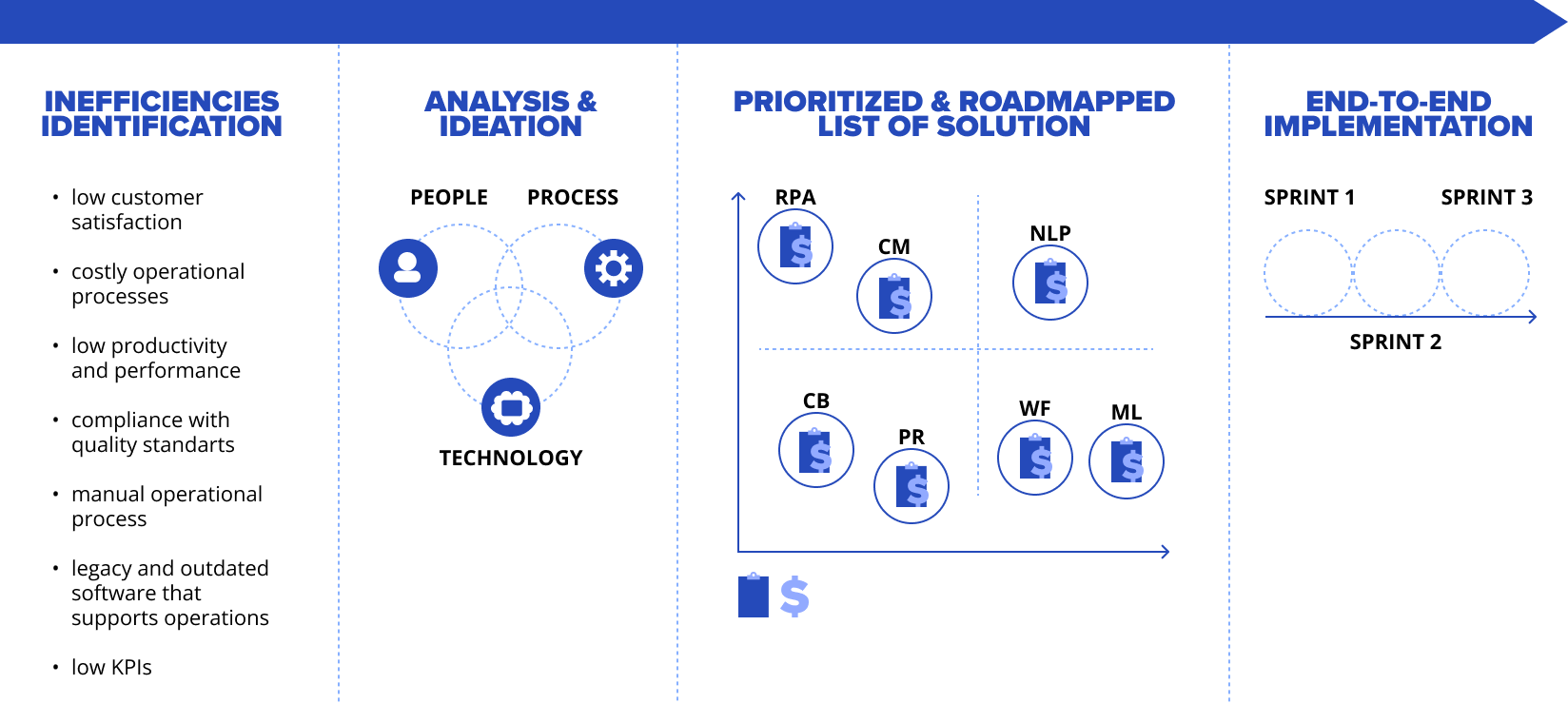How to Achieve Operational Efficiency with Intelligent Automation
In more than half of all jobs, at least a third of the activities involved could be automated. The rapid adoption of technology has accelerated a move towards automation. Companies that don’t explore this option risk losing time and money. Additionally, relying on manual work in vital business processes disrupts business productivity and the ability to innovate. What, specifically, does this mean? Human error still significantly affects business operations. Humans focus on repetitive work rather than contribute to high-value tasks and innovation.
Many businesses perceive process automation tools as costly and complex to integrate into their business process. Still, in practice, automation opportunities are enormous, and each business can find its optimal solution that will be paid off within a reasonable period.
"Intelligent automation is becoming a significant part of how our business operates daily," notes Volodymyr Semenyshyn. He is the Executive Vice President, EMEA and Global Financial Services at SoftServe. "Intelligent automation streamlines tasks and scales what's possible for us humans," Volodymyr adds. "As a result, we're welcoming a growing number of clients eager to use our advanced technology (AI, ML, and more) intersection expertise. These partnerships allow organizations to reach peak operational efficiency, workforce productivity, and, of course, cost savings."
Intelligent automation allows a company to increase the impact of its operations and employees. Organizations can focus on remaining competitive, resolving business issues such as:
- Time-consuming, repetitive, error-prone tasks
- Low productivity and operational efficiency level
- Costly operations
- Low workforce capacity
- Wastage of resources which violates business cycle
What is Intelligent Automation, and what benefits does it bring to operational efficiency?
Intelligent automation integrates artificial intelligence (AI), machine learning (ML), robotic process automation (RPA), and business process management (BPM) technologies. It enables enterprises to scale. They grow from trying fragmentary changes to enabling holistic digital solutions.
The digital transformation process involving intelligent automation is not about substituting humans with intelligent systems and robots. The process of incorporating Intelligent Automation is not about substituting humans with intelligent systems and robots. IA helps augment workers’ capabilities and brings a renaissance to their daily routine job. It can, for example, automate dynamic workflows that require extensive human manual efforts. Consequently, IA empowers employees with a focus on the future and high-impact work.
How do industries benefit from Intelligent Automation?
Intelligent automation boosts a company’s operational efficiency. Here are examples of delivered solutions and achieved business impact across industries.
Retail
Sometimes enterprises use gut instincts and personal experience when quoting a price to a customer. Unfortunately, it results in low or negative margins and lower profits. One solution is to create an intelligent price calculator that provides price recommendations based on business data. SoftServe designed a machine learning engine that calculates the optimal deal price based on historical data, products, and customer characteristics. The result is a customized solution with a price break-down visualization, simulated competitor price adjustments, demand prediction, and more.
Energy, Oil & Gas
Valve failure in oil production happens often, and it causes excessive time and money losses. But how do you predict it? SoftServe determined how machine learning can develop an algorithm collecting data from 100 sensors and predicting potential or imminent valve failure. The prediction model forecasts issues for the next 10 to 14 days and significantly improves uptime by eliminating risks with valves in advance.
Finance
Customer expectations require cross-team collaboration in the finance industry. But how do you accelerate data analysis? An ML-based solution would be the best option. SoftServe’s data experts have extensive experience in implementing ML-powered data warehouse systems. We used this to help a client quickly transform manual tasks into automated operations, accelerating data analysis. In addition, it provides in-depth data insights and improves team collaboration.
The SoftServe approach to Intelligent Automation
Since 1993, we have accumulated substantial experience in many domains, allowing us to deliver solutions for unique and complex use cases. SoftServe’s expertise in Intelligent Automation, process analysis, and end-to-end implementation of intelligent automation systems help enterprises worldwide increase operational efficiency.
SoftServe has elaborated a comprehensive proprietary framework that leverages the process, domain, and technology expertise to analyze process improvements. Verified framework experts consult and assist enterprises in preventing unplanned, fragmentary, and costly changes that look like automation but bring no expected impact.

Let’s talk about how we can help you increase business productivity and innovation by integrating Intelligent Automation.


